

CHENNAI: A year after the death of Senior Counsel v, a highly respected lawyer who turned down offers to be elevated directly as a judge of the Supreme Court in 1986 and that of the High Court in 1970, V Sriram, a city-based historian, released his book, When Mercy Seasons Justice - the Life and Times of Habibullah Badsha, on Sunday.
The title was inspired from Shakespeare’s Merchant of Venice, said Sriram. “Justice is accepted by all, when mercy rains on it. The justice that Badsha delivered, was always seasoned with mercy and kindness,” he said. The first copies of his book were handed over to the Chief Justice of Manipur High Court, R Sudhakar, Chairman of Apollo group of hospitals Prathap C Reddy and the eighth prince of Arcot, Nawab Mohammad Abdul Ali Azim Jah.
During Dravida Munnetra Kazhagam’s regime in 1974, he was made the State Public Prosecutor and in 1987, the then Chief Minister MG Ramachandran appointed him as Special Public Prosecutor to conduct a case related to burning down of copies of the Constitution by 10 DMK MLAs during the party’s anti-Hindi agitation.
In 1991, he was appointed as Advocate-General and refused a similar offer made by DMK president M Karunanidhi in 1996, citing health reasons.
Badsha was actively involved in the development of various educational institutions and had been a counsel for the Music Academy, besides being a founder-director of Apollo Hospitals. Speaking at the event, Reddy said, “Badsha was a great friend and a dedicated board member. He was a trusted advisor of the Apollo family.”
The prince of Arcot said that while Badsha was one of his most important mentors, he was also a silent philanthropist. “He had taken the case of several poor people voluntarily,” he said.
Badsha stood for old-world values in an increasingly aggressive age, said Justice Sudhakar. “Even his opponents in the courtroom readily acknowledged his integrity and his unfailing courtesy,” he said.